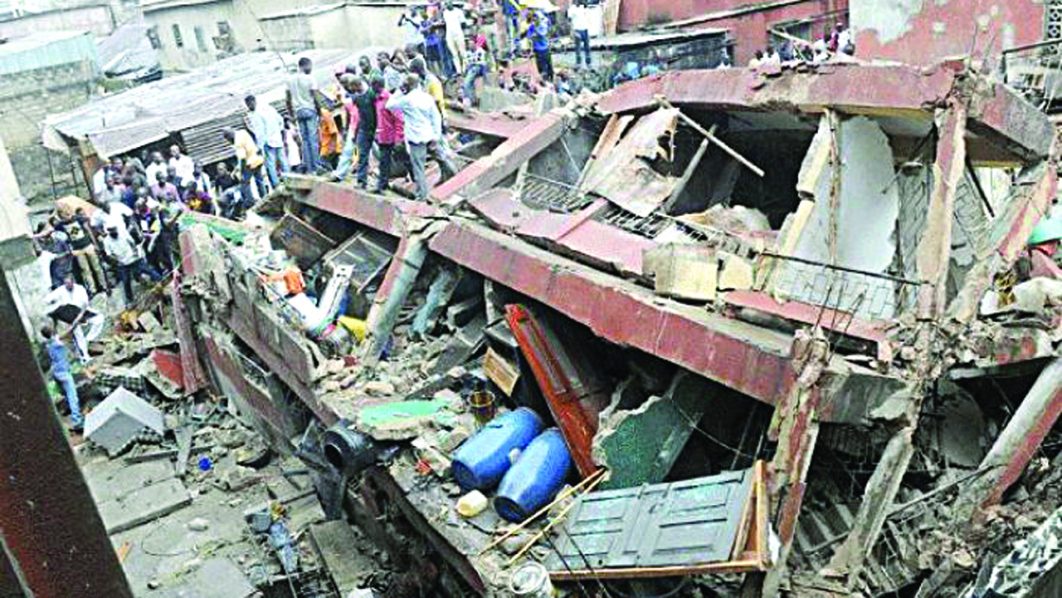
Collapse Building
How would you evaluate building collapse in Nigeria given the recent case in 2023?
It is a national embarrassment and disgrace. The continuous building collapse in Nigeria is an expression of a broken system from a professional viewpoint.
Let us take Lagos State for example, being the ‘centre of excellence’. I think there is a weak link in the building or housing development, approval, construction, and supply chain system. By this, I mean within the government. The agencies managing building approvals, those monitoring the construction processes, the building professionals, and developers, all need to do more. The economic and social losses to building collapses are so huge. There are failings in the system.
It is either what we are seeing are manifestations of corruption in the system or that the professionals involved are incompetent. I can assure you that the last building collapse we saw will not be the last building that will collapse. Unfortunately, no one has ever been prosecuted for the roles. I think that there are lots of square pegs in the round roles within the housing development space.
What do you believe are the factors contributing to building collapse in Nigeria?
The factor responsible for the collapse, in my view, is that there is no due diligence or consideration given to the process of housing development and construction. Unfortunately, focus is excessively given to the end product and its profits.
The fundamental processes of adequate procedures, such as geological and ecological survey, ground stabilization and remediation strategies before housing development and construction are most times ignored. Poor designs, inadequate materials specification and inadequate supervision are some of the fundamental problems.
This is because most of the people who are on the front line of delivery of building projects were ill-trained. Unfortunately, these are related to poor educational system framework and methodology of pedagogy of learning and skills acquisition. Also, I think some operatives in the building construction environment are compromising the system to their own benefit.
They lack integrity in their work and therefore compromise standards. I am not sure of the statistics of professionals that have been deregistered or jailed as a result of poor performance in the industry, especially where deaths were recorded. Unfortunately, anyone can become a builder overnight in Nigeria without any formal training. These are some of the factors responsible for housing collapse.
Do you think the agencies responsible for monitoring building development in Nigeria have fulfilled their obligations, considering the frequent collapses?
I don’t think so. Otherwise, there wouldn’t be rising cases of building collapse. I think the primary issue is ineffective regulation of housing construction and inadequate housing governance. The secondary issue is construction management. There is no significant regulation in housing construction.
It is a shame to see a professional claiming to know all within the construction industry in Nigeria. No role boundaries. In the United Kingdom where I currently practise, roles are clear-cut under the Construction Design Management regulations (CDM). Everyone has significant roles to play, starting from the client’s project conceptualization to the professionals involved in the construction, and safety, control and planning as well as compliance with the building safety and building physics in mind.
Considering the hike in building material prices, what would you recommend at this time for the housing sector?
I think there should be subsidy for construction materials, especially for the development of affordable houses. This must be for low-cost housing projects, and they must be monitored effectively. I remember that some years back, the government introduced price control mechanisms on some products. It should be reintroduced for building materials. Local building materials manufacturers should be encouraged and tax relief on building material importation should be introduced.
The housing strategy I will recommend is housing localism. There should be local delivery framework in which communities are involved in their own annual housing delivery target through the local government housing strategy. This is called bottom-up approach.
What building practices do you consider to be the best globally, and how can they be adapted to Nigeria?
Housing solutions must be developed to suit the environment in which the approach is being adopted because the economic, environmental, social and political context differs from region to region. In Nigeria, the government needs to recognise the impact of climate change in construction activities.
The global sustainable development goal needs local promotion by the government. We have to look inward. The model that can be suggested to the government based on our housing peculiarities in Nigeria is the local housing delivery through friendly housing policy formulation. This will ensure that there are no abandoned projects, and the end-users are adequately considered.
In what ways do you integrate green building techniques into your projects and what benefits do you anticipate from doing so?
Currently, commercial and residential buildings consume about one-third of the world’s energy. Yet the IEA reports that these buildings could actually account for about 41 per cent of global energy savings by 2035 — if construction practices become more energy-efficient. Building should be created in off-site for sustainability. Modular elements can always be assembled and then merged in less time than it takes to erect conventional houses.
Construction sites can be unpredictable, and natural elements like rain or other adverse things may disturb or halt operations. Modular construction defeats these interruptions by keeping the process contained and streamlined for efficiency. This approach can take up to 50 per cent less time than standard on-site projects.
All waste created from modular construction is recyclable. This method cuts down on the amount of energy needed to harvest and build new materials. I think we need to look at this method using our local materials.
There is need for government to cut carbon emissions and capture carbon footprints towards net-zero and climate change. Sustainable construction gains part of its reputation from its building materials, from the design concept to the disassembly after the building’s end-of-life use. There is need to adhere to green standards — whether those of Leadership in Energy and Environmental Design (LEED) that is popular in the United States or the Building Research Establishment Environmental Assessment Methodology (BREEAM) popular in the UK.
These accreditations help builders seek better alternatives to toxic, costly materials. The subsequent materials are often easier to handle, healthier and cost-effective. Nigeria must have a similar organisation to monitor sustainable building delivery.
How do you balance the need for affordable housing with high-quality building standards?
Affordable housing does not mean poor quality housing. What makes housing affordable are some variables hinged on government policies. For example, if building materials are subsidized by the government and are VAT-free, professionals are allowed to participate in accordance with their code of conduct and within the regulatory framework. I am persuaded that high-quality affordable production will be inevitable.
How do you foresee the Nigerian building industry evolving in the next ten years, and how will technology contribute to that evolution?
The future of the building industry in Nigeria starts now. We are about 10 years behind developed countries. Nigeria’s housing policy needs overhauling. This must include wider stakeholders’ participation and technological integration.
What is your expectation of the new government in the housing sector?
The administration of President Bola Ahmed Tinubu should commission a housing committee to be tasked with the holistic appraisal of the housing policy in Nigeria to reflect the country’s housing needs.
The low and middle-income earners should be the focal point. I also think he should create a ministry of community housing and regeneration to be responsible for inner-city regeneration and low-income housing development throughout the federation. If you look at it, our cities are becoming more like a dump yard due to neglect. The administration of President Tinubu should bring about new affordable housing era in Nigeria.






